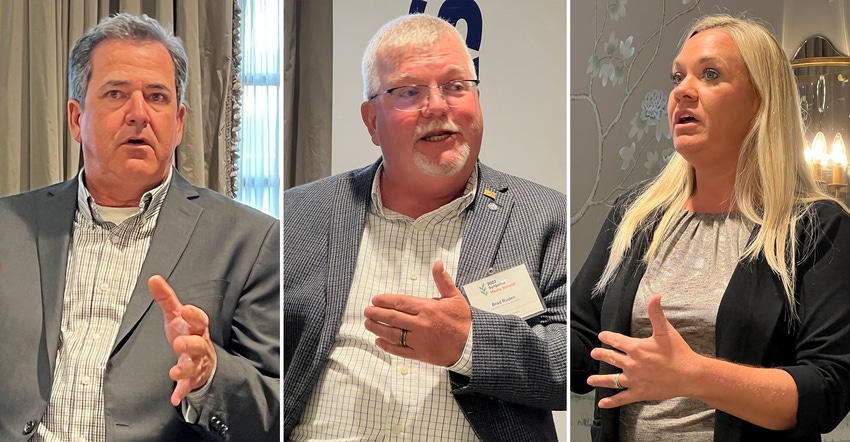November 16, 2022

It’s almost like the start of an ag-focused joke: A farmer, a retailer and a chemical rep walk into a bar. But this time, the three walked in as panelists during a recent media summit conducted by Syngenta. The event, held every two years, offers an in-depth look at different aspects of both the company’s business and the industry.
The farmer, retailer and rep panel shed a light on some of the issues all three will face going into 2023.
Matt Moreland, the farmer on the panel, is with Moreland Farms, an Okahoma-based operation run in general partnership with his wife, Lisa, and their three sons, James, Will and David. The farm raises corn, soybeans, wheat and cotton, and has an excavation and construction business and works land in Oklahoma and Kansas.
Brad Ruden is an agronomy tech services manager with Agtegra Cooperative. The cooperative was formed in 2018 after merging the South Dakota Wheat Growers and the North Central Farmers elevator. Ruden has a diverse role at AgTegra from supporting sales management and sales agronomy teams to conducting field research. The cooperative’s territory covers North and South Dakota and some of western Nebraska.
Jami Loecker is an agronomy service manager for Syngenta in the western Midwest, leading a team of agronomists in technical training and support for the crop protection portfolio for the internal and external sales staff. Her territory includes Minnesota, the Dakotas, Iowa, Kansas, Nebraska and Colorado.
Their comments during the presentation show that what many dealt with in 2022 remains a concern going into 2023.
When asked what’s on their mind for 2023? “It’s still the supply issues,” Moreland said. “And the weather is tough. Most of our wheat went into dry, barren soil but got enough rain to sprout. But it’s not enough for a good crop.”
Retailer Ruden noted that supply is also a concern on his side of the business, although he said AgTegra is better positioned this year than in the past. “As a supplier, we can never be short. We have to provide the supply to our customers as they demand product,” he said.
As farmers plan for the 2023 season, Ruden said he’s seeing some that are reluctant to purchase early. Most of the fertilizer the co-op sells is urea, and the cooperative will turn that supply two to three times in a season. In a side conversation during the summit, he shared concerns about the ability to move urea up the Mississippi, with continued reduced water flows for that transportation pipeline.
Not backing down on weeds
During a discussion on crop protection, the topic of weeds came up. “We’re fighting the Palmer, and we can’t let them emerge,” Moreland said. “We’re stacking residuals.”
Calling himself a “one-pass guy,” Moreland said he is looking at alternative approaches to keep the weed seed bank down.
For Ruden’s territory, he said kochia is the challenge. He also struggles with the concept of a one-pass approach. During a discussion on the nutrient loss caused by a 4-inch weed, it was mentioned that farmers counting on an early-post, one-pass system may be hurting their crop nutrition program as well as cutting yield.
Ruden noted that new genetic systems allow for that early-post pass. “I think we lose sight of the yield loss before weed control out there,” he said. “Those programs don’t work the way we want them to.”
Loecker said that overlapping crop protection technologies can make a difference, and the key is understanding what’s going on in each field. The core is that overlapping residual program, which she noted has been a key discussion point in the field for some time.
“We want to work on how best to implement the tools we currently have,” she said. “With the Syngenta portfolio, we’re able to deliver high economic returns, and we can focus with farmers on how best to do that.”
But how does the practice of overlapping residuals get traction? “They say you have to hear something seven times for it to sink in. Maybe we have to keep having the conversation about overlapping residuals,” Loecker noted.
Adding university data and third-party information beyond Syngenta research showing higher yields and returns may help. Loecker also said it’s important to identify the most critical challenges to solve on an individual farm now. “If you don’t know what’s going on with a grower’s farm, you can’t be effective in helping solve that problem.”
Troubles sleeping
And the standard panel question — What keeps you up at night? — brought these responses:
For Moreland, it’s working in the dryland environment he’s in today where land rents are in the $40-per-acre range. And he’s seeing dryer conditions move north. “We have to set our farm up to survive that, so we’re focusing more on irrigation,” he said. Land he has in Oklahoma has access to sufficient water for the future, and that’s one way he’ll work to keep his farm viable.
For Ruden, it’s the continued challenge of battling weeds. The fight against kochia and waterhemp is a concern. But for 2023, it’s the supply chain that’s an issue. “We’re not out of the woods yet,” he said.
Loecker discussed her passion for agriculture and the need to get the industry message out to those people not experienced in how modern farming works. “How can I do a better job myself, and lift our voices to a level that’s the effective, right language that’s positive in our industry. It’s really personal,” she said.
The challenges for 2023 from supply chain issues to resistant weeds sound like an echo of 2022. Sustaining the farm in the new year will be a test for farmers, retailers and the industry.
About the Author(s)
You May Also Like






